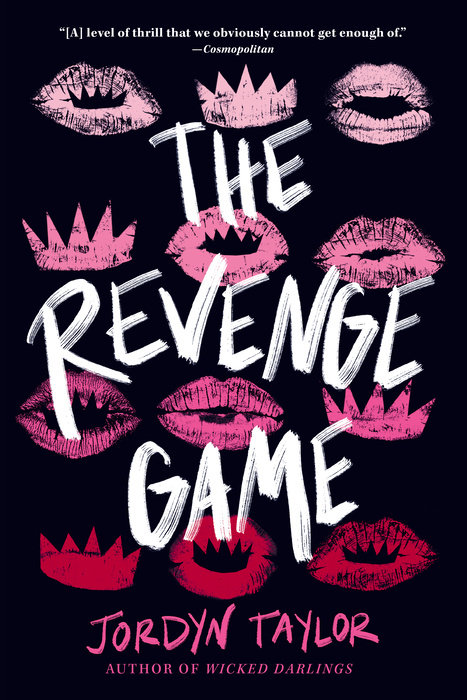The Revenge Game
Author Jordyn Taylor
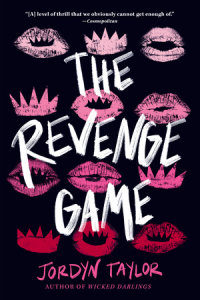
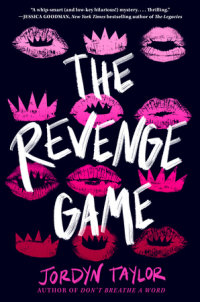
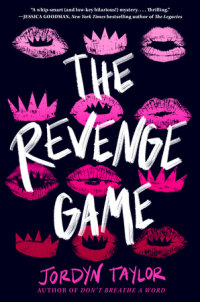
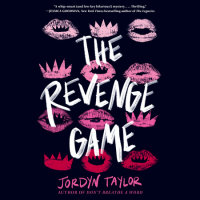
The Revenge Game
A feminist mystery that author Jessica Goodman called "whip-smart and lowkey hilarious", about the dark side of a hopeless romantic's seemingly perfect love story.
Play to win.
Alyson Benowitz is a romantic, and sometimes that gets her into trouble—like when she falls for boys who aren’t into her. But this time it’s different. Her connection with Brenton Riggs Jr., a star athlete at her elite prep school, isn’t just in her head. She’s swept up in her first real relationship.
Then she hears the rumors about a competition the Sullivan-Stewart guys started to see who can get with the most girls. It’s deeply disturbing . . . if it’s true. Is Brenton with Alyson for the right reasons—or is he trying to win some gross game?
And when the girls at school take matters into their own hands, things take an unsettling turn. Lies, secrets, backstabbing . . . when push comes to shove, who’ll be left standing?
An Excerpt fromThe Revenge Game
Chapter 1
September, Seven Months Earlier
I spend a lot of time wondering which of the boys in my immediate vicinity will be the one who finally falls in love with me. For all I know, it could be someone in this AP English Literature class: the guy with glasses in the second row who nodded along as I defined “juxtaposition” a few minutes ago, or maybe the bored-looking kid sitting sideways in the seat in front of me, the tip of his elbow grazing my desk. I steal a glance away from the projector screen to survey the rest of my dozen or so possibilities. I don’t know if it’s the sexy maroon blazers or my sorry excuse for a love life--it’s a hundred percent both--but I’m ready and willing to be swept off my feet by any one of them.
As my eyes dart from one potential suitor to the next, I accidentally tune out Mr. MacMillan as he scrolls through examples of short-story projects his students have done in the past, but that’s…
Chapter 1
September, Seven Months Earlier
I spend a lot of time wondering which of the boys in my immediate vicinity will be the one who finally falls in love with me. For all I know, it could be someone in this AP English Literature class: the guy with glasses in the second row who nodded along as I defined “juxtaposition” a few minutes ago, or maybe the bored-looking kid sitting sideways in the seat in front of me, the tip of his elbow grazing my desk. I steal a glance away from the projector screen to survey the rest of my dozen or so possibilities. I don’t know if it’s the sexy maroon blazers or my sorry excuse for a love life--it’s a hundred percent both--but I’m ready and willing to be swept off my feet by any one of them.
As my eyes dart from one potential suitor to the next, I accidentally tune out Mr. MacMillan as he scrolls through examples of short-story projects his students have done in the past, but that’s all right. The assignment seems easy enough: pick a theme; find three short stories that fit said theme; write a paper comparing and contrasting said stories. It’s the kind of thing I’d probably do for fun in my spare time, which is why I’m the lone junior in this college-level class.
Mr. MacMillan’s next words make me snap back to attention. “In the spirit of you all getting to know each other”--a few people visibly perk up in their chairs, myself included--“I’m going to randomly divide you into pairs. Over the next few class periods, I’ll give you time to choose your stories, analyze them, and write your essays together.”
Oh my God. Oh-my-freaking-God. My chair feels like a roller-coaster car that just left the station, and my blood pumps like I’m chugging up the first big hill. If the point of the group project is everyone “getting to know each other,” then that must mean . . .
I’m going to be matched with a guy.
Now that I’m almost seventeen, “possible conversation with boy” shouldn’t feel like such a momentous occasion, but this is a big deal for me, pathetic as that may sound. Our private school, Sullivan-Stewart Prep, has been coed for all of a week. Before, we were two separate schools: the all-boys Sullivan School in Lake Placid and the all-girls Stewart Academy in Saranac Lake, a cozier, less-tourist-packed town about fifteen minutes away. They bussed us back and forth for a dance here and there, a rare chance for those who liked guys to gain some semblance of sexual experience. We’d spend hours scurrying between dorm rooms to focus-group potential looks, all for a shot at a dance-floor make-out.
This getting-ready ritual always paid off for a handful of girls, and we’d analyze their exploits on the bus ride home. Sometimes they’d gush about a guy being good with his tongue; other times, they’d shudder about too much teeth or spit. Frankly, I would have taken either option. They were both more appealing than what I was getting, which was nothing. My most common achievement was embarrassing myself with my overeagerness, like when I tried to make conversation over the music with a guy who’d come up behind me and started grinding, and he yelled in my ear--as politely as possible--that I was supposed to stay facing away from him, like the other couples. If I hadn’t maintained a steady diet of romance novels all this time, I’d probably be as jaded as my mom, who buries herself in work to avoid having time for a love life.
Don’t get me wrong, Stewart was great from an academic standpoint: cool feminist teachers; lots of extra help if you needed it; a college advisor who encouraged me to take AP English Lit now so I can have it on my transcript when I apply to my über-hard-to-get-into college writing program next fall. But I wished it were coed, like the school on that sexy Spanish Netflix show Elite, where everyone’s hot and constantly falling head over heels for each other--except without all the murder. And then it actually happened (the coed thing--not the murder). Last fall, because of some financial something-or-other, Sullivan and Stewart announced they were merging into one unified school on Sullivan’s campus. To house us, they built two new dorms from stone and wood in the same Adirondack style as the rest of the buildings. You can tell the buildings are out of place with their fresh coats of blue paint, their soft skin that hasn’t seen a frigid mountain winter yet. They stick out just like we do, the Stewart transplants, the ones the teachers keep referring to as the “fresh faces on campus.”
The question dances on the tip of my tongue as Mr. MacMillan gives way too many details on how we should go about choosing our short stories as a team. I know I shouldn’t ask it--that it’ll make me sound desperate, which is exactly what I’m trying to avoid, especially after what happened this summer--but there are only two minutes left in the period. I compromise by not thrusting my hand in the air, as a desperate person might do, but rather raising it at ear height as though I don’t really care if he calls on me or not.
Mr. MacMillan keeps talking. Argh. It’s probably hard for him to see me since he dimmed the lights for the projector. Now there’s only a minute left; people are closing their books and unzipping their backpacks. Screw it. I go for the full-on hand thrust, fingers waggling in the air.
The teacher looks at me. Thank God. “Alyson?”
“Um . . .” I clear my throat. “I was wondering when we’ll find out our partners?” I hear murmurs of agreement from around the room. There--no need to be ashamed. I’ve done a public service.
Mr. MacMillan chuckles. A sixty-something guy with ruddy skin and long, white sideburns, he’s taught at the school formerly known as Sullivan for decades. “I know you’re all chomping at the bit. I didn’t get a chance to make the list before class, so I’ll send it out when we’re finished here.”
The bell rings, and I’ve never been so excited to see the end of an English period. Is that pathetic? Maybe. Probably.
Whatever.
When I get outside, I spot my best friend, Jess Quigley, dragging her feet up the wood-chip path. When she sees me--in other words, when she knows she has an audience--she slumps against a column next to the door and throws her forearm over her eyes. “I am weary,” she moans.
“Why?” I ask, easing her arm off her face. My other hand clutches my phone, my thumb hovering over the refresh button on my email app. So far, nothing from Mr. MacMillan.
Jess runs her nonregulation magenta fingernails through her dyed-black hair, which pops against her ivory skin. She just had AP Macroeconomics in the building next door, and before that, Accounting. Her goal, she says, is to learn everything there is to know about capitalism so she can dismantle it someday. “The mansplaining,” Jess replies, “is going to be the death of me.”
“What happened?”
She sighs. “This random guy apparently felt the pressing need to explain GDP to me. Not, like, how it’s calculated, or what the data is used for, but, like, literally what the letters mean.”
I blink at her. “Um . . . what . . . do the letters mean again?” Jess and I bonded in the eighth grade because we both spent our lunches reading library books for fun, but our areas of expertise couldn’t be more different.
“Gross domestic product,” she answers. “Much like Mr. Mansplainer himself.” She pushes herself off the column, smiling smugly at her own play on words. We start back down the path. “How was English?”
“It was . . .” The most exhilarating class period I’ve had all week? No. I need to control myself, for God’s sake. My heart still stings from what happened a few weeks ago with Aiden, the cute guy from my summer job at the bookstore--the one I totally rubbed the wrong way with what I thought was a romantic gesture. I make sure my voice stays steady as I continue. “It was fine. We’re starting this new group project and our teacher’s choosing the partners.”
“That would be my literal worst nightmare.” Jess kicks a stone and it catapults into the bushes. She was a lot less enthusiastic about the Sullivan-Stewart merger than I was, a firm believer that high school boys lack the emotional maturity and ability to locate the clitoris to make them worthy of our presence. “What if you get paired with some bro who expects you to do all the work?”
“Hmm. I guess that would suck.” Honestly, though? I wouldn’t mind. It’s an English project, meaning I’d do all the work no matter what. “Anyway, cheers to us for making it through the first week.”
“Hell yes. Cheers.”
“I’m so ready for Tasha’s tonight.”
Every year since the eighth grade, Tasha Thompson has had a party the first weekend of the school year. She’s a day student like Jess, whose family lives in one of the giant homes on the shorelines of Mirror Lake--now walking distance from school. Her parents always have some work conference or event on the weekends, leaving Tasha with a lakeside mansion all to herself. There typically aren’t boys at the parties, but when I ran into Tasha in the bathroom, she said she’d opened it up to the whole school. “The more, the merrier, right?” she chirped.
Jess and I follow the path to the sprawling main green, where a few fall sports teams are getting ready to practice. The Sullivan-Stewart campus is a giant grassy oval ringed by dense trees, with the academic and athletic buildings on one end and the dorms, dining hall, and student services center on the other. There’s a main road that leads west down to Mirror Lake and the town of Lake Placid, as well as a network of skinnier trails that snake through the woods. Because it’s the Adirondacks, there are mountains in every direction, where people way fitter and braver than me spend their summers hiking and their winters skiing and snowboarding. (I agree to exactly one High Peaks hike per year with Jess--our tradition on the last weekend of spring semester--but I’d generally rather head to Main Street for the indie bookstore and maple cream soft serve, no matter the season.) To the west there’s the Sentinel Range, and farther off to the northeast is Whiteface, with its impossibly high peak that’s usually capped with snow. The blankets of trees draped over the rocky slopes and cliffs are still green, but soon they’ll be burning up with all kinds of reds, oranges, and yellows.
I skied at Whiteface once with Jess’s family. They moved to the Adirondacks, like so many others, for access to the mountains after city life sapped them of joy. The Quigleys live in Saranac Lake, where Stewart used to be, so Jess has been grumbling about her slightly longer drive to school now. I miss the place, too--not just because it felt more down-to-earth than Lake Placid, but also, randomly, because of its Jewish history. My grandparents, who grew up vacationing there, told me the story one Friday night when Mom and I were at their place for Shabbat dinner: In the late 1800s and 1900s, lots of Jewish travelers went to the “Borscht Belt” in the Catskills, but some bold mountaineers pushed on to the Adirondacks. Many antisemitic vacation spots said Jews weren’t allowed, including this famous social club called the Lake Placid Club. So Jewish people decided to chill around the Saranac Chain of Lakes instead. Knowing the history made me feel strangely at home there, even though I’m not religious. I’m still Jewish, and I would have been banned from the stupid Lake Placid Club all the same.
As we walk the perimeter of the oval, I alternate between checking my inbox and checking out the boys on the cross-country team in their T-shirts and mesh shorts. One of them raises his arms in a triceps stretch, revealing a trail of black hair poking out above his waistband.
Jess pokes me in the shoulder. “Earth to Alyson Benowitz.”
“What?”
“You’re, ah, very obviously staring at that dude’s pelvic region.”
Well, that’s embarrassing. “How do you know I wasn’t contemplating trying out for the team next year?”
“Because you’d literally break your boobs if you ran cross-country.”
We both snort-laugh. She has a point: I started on the pill last year because I kept getting these painful ovarian cysts, and seemingly overnight, my Bs turned into Ds. Besides the fact that physical activity requires an industrial-strength sports bra, I’m now self-conscious that anything I wear with the slightest hint of cleavage makes me look like a porn star. Not that there’s anything wrong with being a porn star, obviously--I personally enjoy their work on occasion. It’s just not necessarily the vibe I’m going for at, say, my cousin Jeremy’s bar mitzvah.
We pull open the heavy door to the dining hall, the place on campus where I feel most like a visitor. Beneath the vaulted ceiling with its gnarled horizontal beams, nearly everything’s made from dark-brown wood, and the walls are hung with antique topographical maps, snowshoes, fishing rods, and bear traps. Joe, the last guy my mom dated--before she gave up on love and married her work laptop instead--used to soak himself in tobacco-scented cologne, and that’s what I half expect the air in here to smell like. The dining hall probably hasn’t changed since Sullivan School was founded in the 1930s, except for maybe the sushi station, paninis, and the presence of quinoa in the salad bar.
“You wanna eat outside?” Jess asks as we wait in line for the aforementioned paninis. She winces as a nearby table of boys erupts in raucous laughter, their guffaws reverberating around the echoey space. I recognize a few of them from class, and of course, part of me wishes we’d just waltz over and join them.
But I’m haunted again by the ghost of Bookstore Aiden and the traumatizing thing he said about me when he thought I wasn’t listening.
“Yeah, I guess that’s fine.”
We pay for our sandwiches and carry our plates to the grass outside, where Jess leads the way to a shady spot under a maple tree. Before I get my hands all greasy with melted local cheddar, I refresh my inbox for the four hundred and sixteenth time.
“Why do you keep checking your email?”
Caught red-handed again. Why is it that as hard as I try to control my worst impulses, they always find a way to wriggle free? I’m supposed to be acting chill. Not desperate. “I’m . . .” There’s no point in lying to Jess; she knows me too well. “I’m waiting for the English teacher to send out the partners for that group project. He said he was going to do it after class.”
